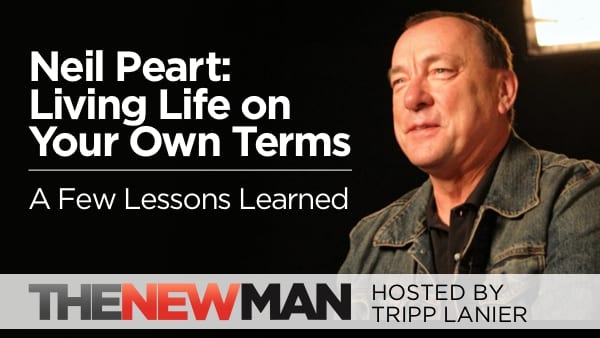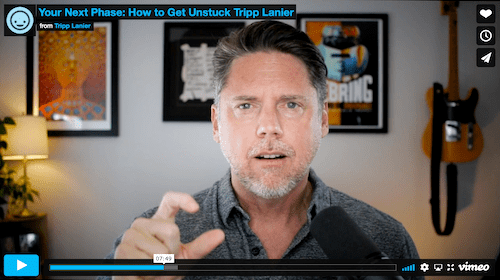Podcast: Download
Subscribe: RSS
Neil Peart: Lessons Learned About How to Live Life On Your Terms
Below is a transcription of this audio:
As a coach, I work with people to help them create the business or relationships or life they truly want. This means that we spend a lot of time dealing with obstacles.
So what does hold us back?
Most think it’s a lack of time or money or energy. Many of us blame a lack of skill or resources or opportunities. And while those things certainly make a difference, they’re not the main thing that keeps us playing small.
That’s because when we dig down deep, we most often find that the big, bad obstacle is our own self-image. It’s the fear that we’ll do something that will get us criticized or make us look stupid. It’s the irrational fear that we’ll end up a loser or an outcast.
In other words, we’re afraid to challenge our self-image — the story we tell ourselves about ourselves — because a threat to our precious self-image can feel like death.
It’s our self-image that will tell us to give up on our dreams because we might fail. It’s our self-image that has us silence our voice because it’s not perfect. And it’s our self-image that convinces us to play it safe because it believes so much is at stake. No matter how much it seems like the world is working against us, most often it’s this primitive, internal desire to fit in, look good, and avoid criticism that has us betray ourselves.
Which is why I believe we need people in our lives that challenge this bullshit. We need those misfits and “uncool” outcasts who do things on their own terms. And I want to be very careful here because going against the grain just for the sake of being a rebel is missing the point. Flipping the bird at convention doesn’t take a lot of balls.
But forging and walking your own unique path does.
Neil Peart was one of these influences for me. He was best known as the drummer for the band Rush. I didn’t know him personally, but nonetheless his way of living spoke much louder to me than his pounding drums.
Neil passed away last week, and while many are recognizing him as a superhuman drummer and introspective lyricist, he was far more than that to me. He wasn’t my favorite drummer or lyricist, but he was one of those rare, few individuals who forged and walked his own path regardless of what others had to say.
Let’s go through some of the ways Neil Peart chose to deviate from the norm in service of simply being Neil.
First off — He was a drummer who wrote lyrics. The stereotype is that drummers can’t even write down a pizza order correctly, but Neil broke from convention. Instead of writing about sex and drugs and partying, he wrote lyrics about everything from black holes to snow dogs to honeydew to priests in the solar federation to classical mythology to his own personal struggles. His lyrics have been vilified and laughed at by both critics and my ex-girlfriends alike. But that never stopped him from writing about what interested him.
Second — He was his own unique drummer. When he showed up on the scene, nobody played like him. Critics said he overplayed and trampled on the songs, but it’s difficult to imagine any Rush song without his fills and patterns. The songs just don’t work without his style. He obviously knew that he sounded different. He obviously heard the critics, but he continued to play the way he wanted to play. And as a result, millions of air drummers flail their arms along to his fills today.
Third — He didn’t sell out. Early in their career, Rush was in a do-or-die situation. After their third album tanked, the label pressured them to release a hit single or else they were going to find themselves working day jobs.
Neil and his bandmates decided that, if they were going to fail, then they were going to do so on their terms. They didn’t deliver the requested three and a half minute radio-friendly single. Instead they dropped a twenty minute prog-rock classic called 2112.
The label shit their pants, but the record became a huge success — even with a photo of the band wearing kimonos on the back cover. After that point, the label never interfered with the band’s creative direction again. And over the years, they continued to take huge risks with their sound knowing it could potentially cost them fans.
Fourth — By the mid-90’s, Rush had sold millions of albums and were packing arenas with loyal fans like me. This is the point in a career when it’s tempting to just follow the formula and make sure you don’t rock the boat.
Neil was arguably the greatest drummer alive, but instead of coasting, he chose to reinvent himself. At a time when he was known as “the professor” behind the kit, he hired his own drum teacher. He stripped his technique down to the studs and emerged with a new grip, a new feel, and a new goatee.
The guy never slept on his craft.
And fifth — Even the way Neil chose to tour was on his terms. To break up the monotony of life on the road in the 80’s, Neil would have the bus drop him off way out of town, and he would ride his road bike the rest of the way to the gigs.
Let’s keep in mind that his physical health was essential to the jobs of many people — not to mention millions of dollars in touring income. With so much at stake, it would make sense to simply play it safe and stay on the bus. But instead, Neil traded the bicycle for a motorcycle so he could ride even more.
While his bandmates understandably chose to travel in a cushy, private jet, Neil found the most obscure, out of the way cow paths to get to the gig. He found a way to make touring an adventure because he saw life as an adventure. He didn’t settle for monotony.
These are just a handful of ways that Neil broke the mold and illuminated another way of thinking. I don’t believe he lived this way because he was some adolescent punk. I don’t believe he was raging against a machine or striving to prove anything to anyone. I know Neil wasn’t perfect, but I like to believe his uniqueness was driven by something much deeper.
Joseph Campbell once said, “People say that what we’re all seeking is a meaning for life. I don’t think that’s what we’re really seeking. I think that what we’re seeking is an experience of being alive.”
Neil comes to mind when I read this passage. I like to believe that Neil was simply committed to his inner compass. I like to believe he simply did what gave him the deep satisfaction of feeling alive.
Which is why it’s really tough that he’s now gone. The guy was so committed to living fully that it’s hard to grasp that he’s not alive anymore — at least not in his body.
So I offer a big thank you to Neil for demonstrating what it means to create a life on your own terms. He showed us that there will always be resistance, there will always be critics, and there will always be obstacles — we just don’t have to let them stop us from living life fully.
His passing reminds us that if we want to find what we’re ultimately seeking — to feel alive, as Campbell says — then we can’t expect to get something for nothing. We need to be willing to risk death — at least to our precious self-image.
Here’s to Neil Peart and that part in all of us that is determined to live and love fully. Let’s not sweat the small stuff. There’s just no time to waste.





